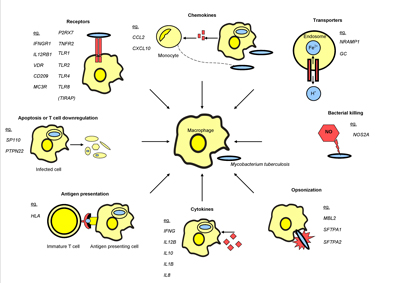Association Studies
 Population-based
case-control association studies are often utilized for the
identification of common variants in genes causing common disease such
as TB. Some of the major genes identified by this approach and validated
in several populations including our work, include the chemokine (C-C
motif) ligand 2 (CCL2), human leukocyte antigen (HLA), interferon-γ (IFNG), mannose-binding lectin (MBL), nitric oxide synthase 2, inducible (NOS2A), solute carrier family 11A member 1 (SLC11A1), SP110, and the toll-like receptor (TLR) genes. The large numbers we use mean that these studies are well-powered.
Population-based
case-control association studies are often utilized for the
identification of common variants in genes causing common disease such
as TB. Some of the major genes identified by this approach and validated
in several populations including our work, include the chemokine (C-C
motif) ligand 2 (CCL2), human leukocyte antigen (HLA), interferon-γ (IFNG), mannose-binding lectin (MBL), nitric oxide synthase 2, inducible (NOS2A), solute carrier family 11A member 1 (SLC11A1), SP110, and the toll-like receptor (TLR) genes. The large numbers we use mean that these studies are well-powered.
We have also done linkage studies which in one case identified the variations located in cathepsin Z (CTSZ), melanocortin 3 receptor (MC3R),
which were then validated by us in a case-control design. In another
linkage project, we found two loci influencing reaction to the
tuberculin skin test, which implies a degree of protection from TB.
Genome-wide
association studies (GWAS) are also free of assumptions of involvement
in a disease, and employment of this recent methodology is underway to
find novel loci involved in TB.

